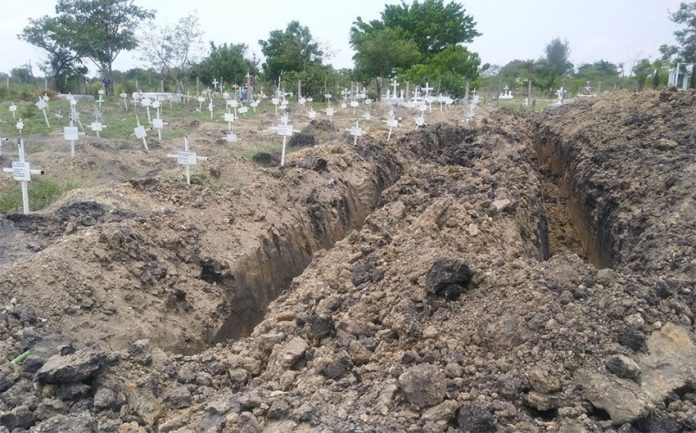More than 14,000 unidentified bodies were buried in common graves between 2013 and September 2019, an analysis of official records has found.
The newspaper Milenio established via responses to freedom of information requests from state-based morgue authorities, health departments and attorney general’s offices that 14,015 bodies were sent to common graves in 28 states under the designation NN: Ningún Nombre, or “No Name.”
The rate at which unidentified bodies were buried in common graves in the almost seven-year period is unprecedented yet the real number of corpses is certain to be significantly higher because authorities in four states – México, Morelos, Nayarit and Tlaxcala – didn’t provide data.
The period analyzed by the newspaper takes in all but one month of the six-year term of former president Enrique Peña Nieto as well as the first 10 months of the government led by President López Obrador.
During the period, the bodies of 11 of every 100 victims of intentional homicide were not identified and now lie in common graves. More than half the unidentified victims were killed and buried in just five states.
Almost 3,000 unidentified bodies were sent to common graves in Baja California, more than 1,500 in Jalisco and just under that number were buried in Mexico City. More than 1,000 unidentified bodies were buried in Nuevo Léon and just under 1,000 went to common graves in Sonora.
Unidentified homicide victims in the five states account for 56% of the total across Mexico, excluding the four states that didn’t provide data.
The states where authorities said the least number of unidentified bodies were sent to common graves were Oaxaca with 13, Campeche with 26, Aguascalientes with 78 and Colima with 84.
Milenio raised doubts about the figure from Colima, pointing out that it appears inconsistent with the number of murders in the small Pacific coast state, which has the highest per-capita homicide rate in the country. In Oaxaca, no records of NN bodies were kept until this year.
In Nayarit, one of the states that didn’t provide data, common grave burial statistics are believed to have been manipulated during the period that former attorney general Édgar Veytia – currently in prison in the United States for drug trafficking – was in office, and in cahoots with organized crime.
Milenio said that the failure of México state authorities to provide data represented a “significant statistical hole” because the state is the most populous in the country and has a high homicide rate.
If the rate at which unidentified bodies were buried in common graves in the first nine months of this year continues at the same pace in the final quarter, 2,222 cases will be recorded in 2019.
In the past six years, only in 2018 — the most violent year in recent history — did a higher number of unidentified corpses go to common graves.
Mexico’s morgues have been overwhelmed with bodies due to soaring levels of violence.
The National Human Rights Commission said last week that there are more than 30,000 unclaimed and unidentified bodies as well as an unknown number of skeletal remains in morgues across the country.
There is “a crisis in the area of forensic identification,” the commission said, because morgues lack the resources, staff and equipment to properly examine the bodies they receive.
Source: Milenio (sp)
